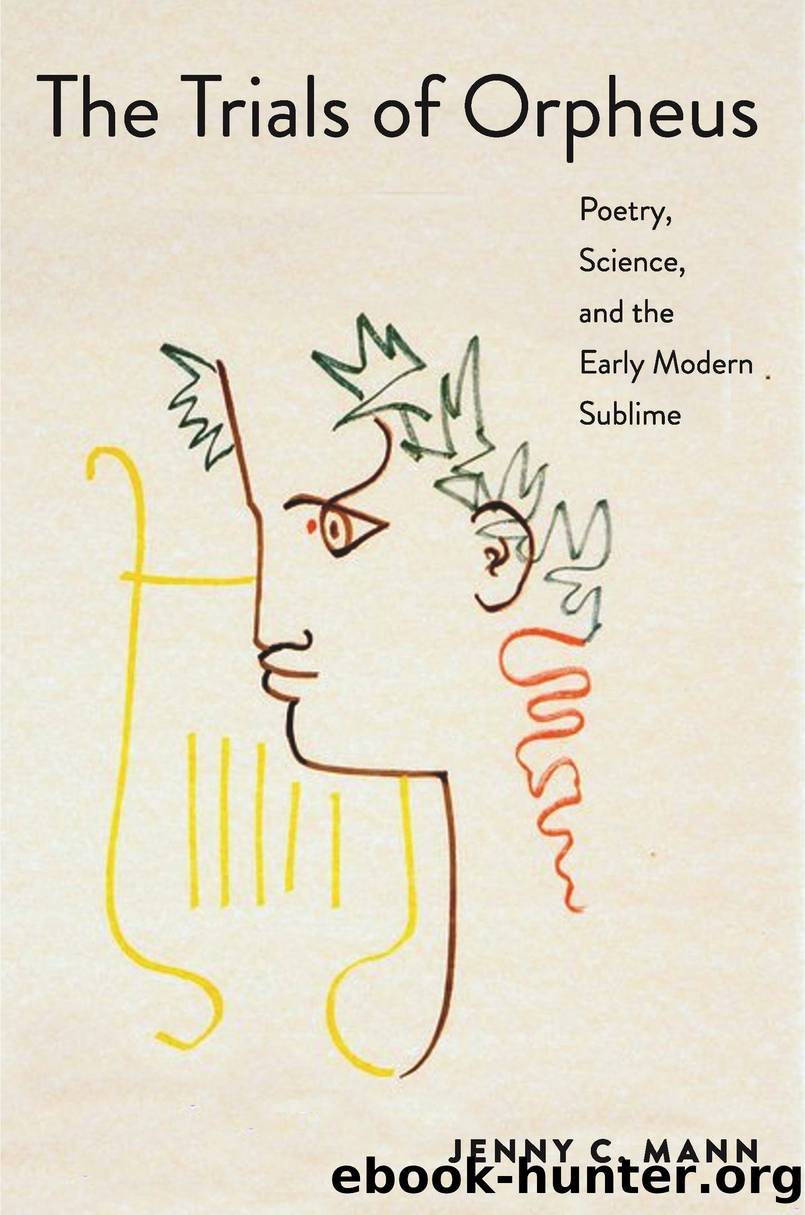The Trials of Orpheus by Jenny C. Mann;

Author:Jenny C. Mann;
Language: eng
Format: epub
Publisher: Princeton University Press
Published: 2021-07-27T00:00:00+00:00
* * *
What man will now take liberal arts in hand,
Or think soft verse in any stead to stand?
âCHRISTOPHER MARLOWE, ALL OVIDS ELEGIES (CA. 1599)66
In depicting the language arts in tactile terms (something that can be taken âin handâ), these lines from Marloweâs translation of Ovidâs Amores betray an Orphic orientation. They thus offer an apt point of entry to examine the construction of an English poetics of softness at the end of the sixteenth century. Ovidâs poem originally inquires, âAnd does anyone still respect the freeborn arts, or deem tender verse brings any dower?â (Et quisquam ingenuas etiamnunc suspicit artes, / aut tenerum dotes carmen habere putat?). Marloweâs translation insists on the masculinity of the poet who is invited to act on behalf of what he calls âsoft verse.â67 Further, this query (âWhat man â¦?â) follows a notorious depiction of male impotence in Elegy 3.6, so it is difficult not to read the call for a male poet to âstandâ as anything other than an opportunity to repair the speakerâs recent sexual âdisgrace,â when his member âwould by no means standâ (Elegies 3.6.83, 3.6.75). But how can a man âstandâ up in âsoft verseâ? Doesnât softness threaten to undo the very virility required for such masculine self-assertion? Marloweâs Elegies attempt to fulfill this paradoxical request, drawing on Ovidâs poetry in order to present its readers with a discourse of vernacular poetic invention that does not rely solely on metaphors of virility to ensure its genesis and effects. Rather, Marloweâs Elegies present âsoftnessâ as the very ground of poetic invention.
Marloweâs assertion of the potency of a soft poetics must be understood in the context of the classical and humanist tradition discussed earlier, which routinely denounces flaccid or nerveless expression, conflating poetic and rhetorical style with approved forms of masculinity. Yet despite the usual deployment of mollis and its cognates as shameful terms for effeminacy, Ovidâs Amores depict the loss of bodily and linguistic vigor as the basis for poetic invention and the model for a formal practice characterized by the adjective âsoftâ (mollis) and its synonyms. Ovidâs elegies toy with the mollis/nervosus, or effeminate/virile, opposition outlined in theories of classical oratory and poetry; indeed, they exemplify the stylistic and thematic concerns censured as effeminate by classical and humanist moralists alike.68 As a translator, Marlowe confronts a further paradox, for he has to accommodate the malleable qualities of Ovidâs âtender measuresâ (teneris ⦠modis) to his own early modern English vernacular, a language notorious for its barren vocabulary, harsh monosyllables, and unyielding grammar (Amores 2.1.4). How can one write âsoft verseâ in such a language? Given this predicament, I argue that the narrative of masculine subjection contained within Ovidâs Amores is redoubled in Marloweâs translation, as the English poet subjects himself and his language to the influence of a superior model. However, because Ovidâs Amores depict effeminization and even impotence as a means of poetic production, the impotence of the English translator proves to be enabling rather than disabling. Indeed, it proves to be Orphic.
Download
This site does not store any files on its server. We only index and link to content provided by other sites. Please contact the content providers to delete copyright contents if any and email us, we'll remove relevant links or contents immediately.
4 3 2 1: A Novel by Paul Auster(11764)
The handmaid's tale by Margaret Atwood(7424)
Giovanni's Room by James Baldwin(6782)
Asking the Right Questions: A Guide to Critical Thinking by M. Neil Browne & Stuart M. Keeley(5339)
Big Magic: Creative Living Beyond Fear by Elizabeth Gilbert(5329)
Ego Is the Enemy by Ryan Holiday(4924)
On Writing A Memoir of the Craft by Stephen King(4650)
The Body: A Guide for Occupants by Bill Bryson(4560)
Ken Follett - World without end by Ken Follett(4428)
Bluets by Maggie Nelson(4245)
Adulting by Kelly Williams Brown(4214)
Eat That Frog! by Brian Tracy(4134)
Guilty Pleasures by Laurell K Hamilton(4104)
White Noise - A Novel by Don DeLillo(3819)
The Poetry of Pablo Neruda by Pablo Neruda(3802)
Fingerprints of the Gods by Graham Hancock(3722)
Alive: The Story of the Andes Survivors by Piers Paul Read(3716)
The Book of Joy by Dalai Lama(3676)
The Bookshop by Penelope Fitzgerald(3609)
